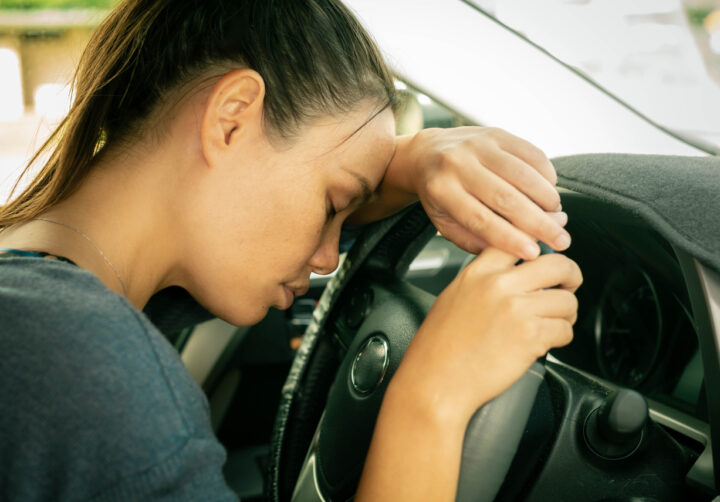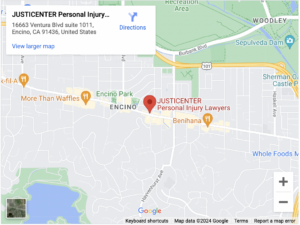JUSTICENTER Personal Injury Lawyers | June 16, 2025 | Personal Injury

Most people think of broken bones and totaled cars when they imagine a car accident. But the damage often goes deeper than what we can see. The emotional and psychological toll of a crash can be just as serious as physical injuries, and sometimes even harder to heal.
If you’ve been in a car accident, it’s normal to feel shaken, anxious, or overwhelmed. These feelings can last long after your physical injuries have healed. Understanding the emotional impact of a car crash is a critical step toward recovery.
Common Emotional Responses After a Crash
Every accident is different, and so is every person’s response. But there are some common emotional and psychological symptoms that people often experience after a crash:
- Shock and disbelief. Many people feel stunned or numb in the hours or days after an accident. It may take time to fully process what happened.
- Anxiety. You may feel nervous, restless, or on edge. Every day activities like driving or even riding in a car might trigger fear or panic.
- Guilt or shame. Some survivors blame themselves, even if the accident wasn’t their fault.
- Anger and frustration. It’s common to feel angry about what happened, especially if the crash was caused by someone else’s carelessness.
- Sadness or depression. A serious accident can lead to long-term emotional distress, feelings of hopelessness, or loss of interest in things you once enjoyed.
- Sleep disturbances. Nightmares, insomnia, or frequent waking can be signs of emotional trauma.
- Avoidance. You might avoid the location of the crash or the activity you were doing at the time.
These are normal reactions to a traumatic event. But if they persist for weeks or interfere with daily life, it may be a sign of something more serious.
Post-Traumatic Stress Disorder (PTSD) After a Car Accident
For some people, a car accident can trigger post-traumatic stress disorder (PTSD). This is a mental health condition that can develop after a terrifying or traumatic experience.
PTSD Symptoms
Symptoms of PTSD may include:
- Flashbacks or intrusive memories of the crash
- Nightmares
- Severe anxiety when thinking about or encountering reminders of the accident
- Feeling emotionally numb or disconnected
- Irritability or sudden mood swings
- Avoiding driving or riding in cars altogether
PTSD is not a sign of weakness: it’s a real medical condition that affects people of all ages and backgrounds. While some think PTSD requires exceptional or long-term trauma like combat, the truth is that many traffic accident survivors develop PTSD.
PTSD Statistics
About 25-33% of people have PTSD at least one month after a motor vehicle accident, according to various studies. One study found an incidence rate of 27.5% six months after a severe accident, and 24% a year later.
Related Psychological Problems
Other psychological problems are also common, particularly:
- Acute stress disorder, which is similar to PTSD but occurs within the first month
- Mood disturbances
- Major depressive episodes occur in about one-quarter of people
- Anxiety disorders, which affect 7% to 31% of people after a crash
- Travel phobia or anxiety, which is most likely to affect female passengers versus drivers, motorcyclists, and pedestrians
People who develop PTSD after an accident are likely to also experience anxiety and depression.
The Ripple Effect on Daily Life
The emotional impact of a car crash can affect every part of your life. You may miss work, struggle to maintain relationships or care for your children, or avoid social activities. You may feel isolated, afraid to travel again, and have difficulty sleeping.
In severe cases, emotional trauma can lead to substance abuse or suicidal thoughts. That’s why early treatment and emotional support are so important.
Emotional Recovery Takes Time
There’s no set timeline for emotional healing. Some people feel better in a few weeks, while others may struggle for months or even longer. Factors that can affect emotional recovery include:
- The severity of the accident
- Whether someone was seriously injured or killed
- Previous mental health history
- The level of support from family, friends, or a therapist
- Coping mechanisms
- Financial and legal stress following the crash
- Access to mental health resources
Give yourself permission to feel and time to recover. Emotional wounds may not be visible, but they’re just as real.
Getting Help Is a Sign of Strength
If you’re struggling after a car accident, it’s important to know that help is available. Talking to a mental health professional can make a big difference. Therapy can help you:
- Process trauma
- Manage anxiety or depression
- Learn coping strategies
- Rebuild confidence behind the wheel
- Improve sleep and focus
There are many types of therapy that may be beneficial. Cognitive behavioral therapy (CBT) is a common evidence-based approach to identifying and changing thought patterns. Eye movement desensitization and reprocessing (EMDR) is a specialized form of therapy that can be very effective to process traumatic memories after your crash.
You may also find that support groups, mindfulness exercises, and regular physical activity can aid in emotional recovery. Even small steps, like journaling or spending time in nature, can help reduce stress and improve well-being.
Emotional Injuries Are Real and Legally Recognized
In a personal injury case, victims can seek compensation for non-economic damages, which address the physical, psychological, and emotional toll of the crash. Sometimes called pain and suffering, these damages recognize the impact of your injuries beyond lost wages and bills.
You may pursue money from the at-fault party to compensate for:
- Anxiety
- Depression
- PTSD
- Sleep issues
- Mental anguish
- Loss of enjoyment or quality of life
To support a claim for emotional harm, it helps to keep records of therapy sessions, medical diagnoses, medications, and journal entries. These can show how the accident has affected your mental health and day-to-day life.
Contact a Car Accident Attorney For Help
The road to emotional recovery after a car accident isn’t always straight. There may be ups and downs, good days and setbacks. With time, support, and care, most people are able to heal and move forward. If you or someone you love has been emotionally affected by a car accident, know that you are not alone.
Emotional injuries deserve attention, compassion, and the same level of care as physical ones. If you need help navigating a car accident’s aftermath, contact JUSTICENTER Personal Injury Lawyers for a free consultation today at (833) 852-3600.
Our main office is in Encino, CA, but we serve all through Los Angeles County.
JUSTICENTER Personal Injury Lawyers
16633 Ventura Blvd suite 1011,
Encino, CA 91436

